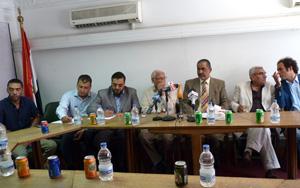Calling for Calm in Egypt
Representatives from Islamist, secular and Tahrir youth organizations met to issue a public call for unity ahead of Friday’s mass protest in Cairo. (photo: Matthew Bell)
Political activists in Egypt’s capital are calling for a display of unity this Friday. Violent clashes over the weekend have raised fears that the weekly demonstration in Cairo’s Tahrir Square could turn bloody. But leaders from a range of political organizations say they don’t want to see that happen.
One of the Egyptian state-run TV channels this week put an icon in the upper left-hand corner of the screen. It’s a handshake with the caption, “the army and the people are one revolution.” At the start of their uprising six months ago, very few Egyptians would have questioned that sentiment. But times have changed.
22 year-old Hani Abdel-Radi and a few comrades beat the afternoon heat sitting in a tent equipped with an electric fan. For nearly three weeks now, they’ve been camped out in Cairo’s Tahrir Square. Abdel-Radi said hundreds of demonstrators have re-taken the square for one simple reason: the demands of the revolution have not been met.
“Since January 25, when everything started, we have been demanding freedom and social justice,” Abdel-Radi said. “And the military that rules the country now, it’s just like the regime under Hosni Mubarak.”
Demonstrators in the square have lost patience with the Egyptian army. And the feeling is mutual. This past Saturday, thousands of protesters marched from Tahrir Square toward Cairo’s military headquarters. When clashes broke out between demonstrators and crowds of men in civilian clothes, soldiers fired warning shots in the air. It’s not entirely clear who they were: pro-military youth from the neighborhood, or as some suspect, hired thugs. In any case, the melee went on for hours. Several hundred people were injured.
The military blamed the Tahrir demonstrators for the trouble, even accusing some of its most prominent leaders of being foreign-funded saboteurs. A leading Islamist group went further. Gama’a Islamiya issued a statement saying its members would lead a march of ultra-conservative Salafi Muslims to Tahrir this Friday to “cleanse the square.” The group soon retracted the threat.
But the heated atmosphere has raised the prospect of more violence ahead of tomorrow’s mass rally in Tahrir Square. And for the last two days, it’s prompted public calls for calm.
Leaders from some of Egypt’s most influential political factions shut themselves into a cramped meeting room yesterday. They emerged with a statement they said represents a consensus among supporters of the revolution.
Husam Abu El-Mukhery is with a Salafi group called the New Muslim Right Coalition. “Despite the disagreements, there’s a good spirit between the different groups here,” El-Mukhery said. “All of us will demonstrate together on Friday.” He said the talks would be “very, very peaceful.” Then he added, “We hope Friday will be a success. If the youth in Tahrir want to continue their sit-in protest, that is their right.”
For now, most Islamist and secular leaders are publicly calling for unity. They’re playing down their biggest disagreement. Secular groups want a set of rules that would limit Islamist influence on the process of re-writing Egypt’s constitution, which will follow elections this fall. Islamists see that move as a threat to Islam and Sharia Law. In a bid to pre-empt any violence, tomorrow’s mass demonstration has been given the name “Consensus Friday.”
The World is an independent newsroom. We’re not funded by billionaires; instead, we rely on readers and listeners like you. As a listener, you’re a crucial part of our team and our global community. Your support is vital to running our nonprofit newsroom, and we can’t do this work without you. Will you support The World with a gift today? Donations made between now and Dec. 31 will be matched 1:1. Thanks for investing in our work!
